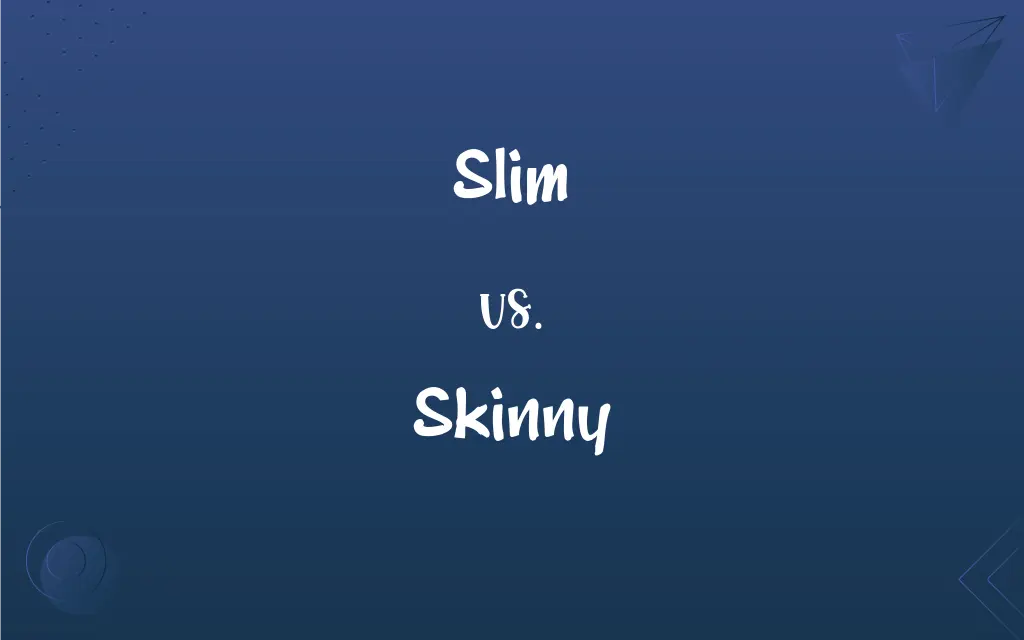Slim vs. Skinny: What's the Difference?
Edited by Janet White || By Harlon Moss || Updated on October 3, 2023
"Slim" refers to a slender, often healthily thin figure, while "skinny" implies being very thin, sometimes to a point of being less than healthy.

Key Differences
"Slim" often carries a positive connotation, reflecting a trim and fit body shape. Conversely, "skinny" might suggest a high degree of thinness that can be perceived as less healthy or less muscular. Each word, while describing a general lack of body fat, offers a different nuance regarding physique and wellness.
The term "slim" can denote a physique that is lean but perhaps also toned and in proportion. On the other hand, "skinny" might imply a noticeable, potentially excessive, absence of body mass. While both terms imply low body fat, "skinny" might indicate a lack of muscle mass as well.
When referring to objects, "slim" often indicates a sleek, slender design, offering a sense of elegance or sophistication. Contrastingly, "skinny" may suggest that an item is noticeably thin, possibly highlighting a lack of substance or durability.
In fashion, a "slim" fit suggests a cut that is narrow and not overly loose, while not being restrictively tight. Conversely, a "skinny" fit typically refers to garments that are very tight and form-fitting, closely adhering to the body's shape.
"Slim" chances imply a small degree of probability, with a somewhat neutral or even positive tone. Whereas, "skinny" is rarely used metaphorically to imply likelihood, showcasing the somewhat limited semantic range of the word as opposed to "slim".
ADVERTISEMENT
Comparison Chart
Connotation
Often positive, suggests healthy thinness.
Can imply excessive or unhealthy thinness.
In Fashion
Describes a fit that is slender and not loose.
Indicates a very tight, close fit.
Used Metaphorically
Yes, e.g., "slim chances."
Rarely used metaphorically.
Implication in Physical Form
Suggests lean and possibly toned form.
Implies a high degree of thinness.
In Describing Objects
Indicates sleekness and elegance.
May highlight lack of substance or durability
ADVERTISEMENT
Slim and Skinny Definitions
Slim
Slim refers to being gracefully thin.
She has a slim physique.
Skinny
Skinny can imply a lack of desirable or necessary content or depth.
The report was pretty skinny on details.
Slim
Slim may denote a small amount or likelihood.
He has slim chances of winning the lottery.
Skinny
Skinny refers to something extremely tight-fitting.
She purchased a pair of skinny jeans.
Slim
Slim can be used to describe a reduced amount or degree.
He managed to slim down his bulky backpack.
Skinny
Skinny describes being very thin.
She was described as tall and skinny.
Slim
Slim suggests being slender and in proportion.
The model had a slim waistline.
Skinny
Skinny implies a visibly pronounced lack of body mass or fat.
The veterinarian noted the dog was too skinny.
Slim
Slim can describe something small in width or diameter.
The slim book fit perfectly in the small space.
Skinny
Skinny indicates a lack of excess weight or substance.
He lifted the skinny cat with ease.
Slim
Small in girth or thickness in proportion to height or length; slender.
Skinny
Having very little bodily flesh or fat, often unattractively so; very thin.
Slim
Small in quantity or amount; meager
Slim chances of success.
Skinny
(informal) thin, generally in a negative sense (as opposed to slim, which is thin in a positive sense).
Her recent weight loss has made her look rather skinny than slender
Slim
To become or make slim.
Skinny
Having reduced fat or calories.
Slim
To lose or cause to lose weight, as by dieting or exercise.
Skinny
Naked; nude (chiefly used in the phrase skinny dipping).
FAQs
Is "skinny" used to describe clothing?
Yes, "skinny" can describe tight-fitting clothing, like skinny jeans.
Can "slim" imply a small chance?
Yes, e.g., "slim chances" denotes a small likelihood.
Does "slim" have a positive connotation?
Generally, "slim" does carry a positive or neutral connotation, implying healthy thinness.
Does "skinny" imply a lack of muscle?
"Skinny" often implies both low fat and potentially low muscle mass.
Can "slim" refer to objects?
Yes, "slim" can describe objects as being slender or having a sleek design.
Can "skinny" refer to lack of detail?
Yes, describing something as "skinny" may imply it lacks sufficient detail or substance.
Is "skinny" always negative?
Not always, but "skinny" can imply an undesirable or unhealthy level of thinness.
Can "skinny" describe beverages?
Yes, like a "skinny latte," meaning with low-fat or non-fat milk.
Is "slim fit" a fashion term?
Yes, "slim fit" describes clothes that are neither too tight nor too loose.
Does "slim" imply healthiness?
Often, but not always—context is key.
What is "skinny dipping"?
"Skinny dipping" refers to swimming without any clothes on.
Can "slim" refer to people and objects?
Yes, "slim" can describe both a slender person and a sleek object.
Is "skinny" ever used positively?
Yes, "skinny" can be neutral or even positive depending on context and perception.
Is "skinny" only for living things?
No, "skinny" can describe anything noticeably thin, like a skinny latte.
Can "slim" describe a likelihood or chance?
Yes, as in “slim chances,” which means a low probability.
Can "slim" describe a reduction?
Yes, "slim" can describe reducing size or amount, like slimming down weight.
Is "the skinny" a phrase?
Yes, "the skinny" is slang for the inside scoop or detailed information.
Can "slim" mean refined or elegant?
Yes, particularly when describing objects, "slim" may suggest an elegant sleekness.
Can "skinny" suggest frailty?
Yes, "skinny" can imply frailty due to pronounced thinness.
Does "slim" always refer to appearance?
No, "slim" can also denote a small amount or likelihood, not just physical attributes.
About Author
Written by
Harlon MossHarlon is a seasoned quality moderator and accomplished content writer for Difference Wiki. An alumnus of the prestigious University of California, he earned his degree in Computer Science. Leveraging his academic background, Harlon brings a meticulous and informed perspective to his work, ensuring content accuracy and excellence.
Edited by
Janet WhiteJanet White has been an esteemed writer and blogger for Difference Wiki. Holding a Master's degree in Science and Medical Journalism from the prestigious Boston University, she has consistently demonstrated her expertise and passion for her field. When she's not immersed in her work, Janet relishes her time exercising, delving into a good book, and cherishing moments with friends and family.































































